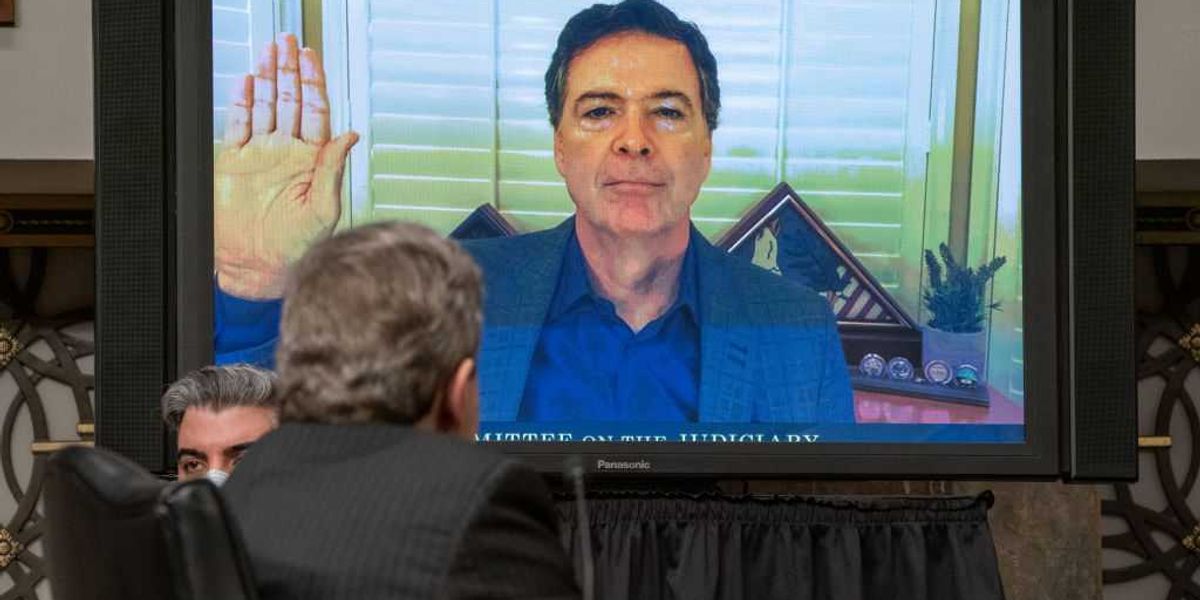Republican legal experts are urging President Trump’s Treasury Department to undo a policy change which they argue allows cartels to facilitate fentanyl and human trafficking through shell corporations.
Treasury announced in March they would be suspending enforcement on a key element of the Corporate Transparency Act (CTA).
Reversing a Biden-era law that went into effect in January, the department’s Financial Crimes Enforcement Network (FinCEN) will no longer be enforcing fines or penalties for American companies who don’t report beneficial ownership information (BOI) for their companies to the government.
Initially enacted in 2021, the CTA gave companies until January 2025 to file paperwork which provided ownership information for their business to the Department of the Treasury — or risk facing steep fines if they failed to comply.
The U.S. Department of Treasury is scrapping a requirement for U.S. small businesses to report information about their owners to the federal government.
The Corporate Transparency Act, passed in 2021, required millions of businesses to report basic information on their…
— unusual_whales (@unusual_whales) March 25, 2025
The law sought to promote transparency in the creation of corporations or limited liability companies (LLCs).
Its stated aim was to end the facilitation of illegal activity including: “money laundering, the financing of terrorism, proliferation financing, serious tax fraud, human and drug trafficking, counterfeiting, piracy, securities fraud, financial fraud, and acts of foreign corruption.”
Critics maligned the law as a thorn in the side of honest business owners.
“The burdens it places on small businesses — particularly during the holiday season — strongly outweighs its intended benefits,” James Carter and Palmer Schoening wrote in December.
“Small businesses fear their information will be targeted by criminals, politically motivated individuals, or subject to cyberattacks by our nation’s adversaries, that could expose their personal information to actual criminals and nefarious actors,” the National Federation of Independent Businesses argued.
NFIB member Elden Johnson and NFIB VP of Federal Government Relations Jeff Brabant testified before U.S. House Committees urging Congress to alleviate regulatory burdens and repeal the Corporate Transparency Act. NFIB’s lawsuit remains active.
More: https://t.co/oCv46wtTMl pic.twitter.com/wCq4bbSlf1
— NFIB (@NFIB) April 22, 2025
President Trump himself even called the law “an economic menace” on social media.
A major victory for South Carolina’s economic freedom! For years, we’ve battled the Biden administration in court, arguing that the Corporate Transparency Act (CTA) is unconstitutional and tramples on the rights of states and citizens. Thanks to President @realDonaldTrump, the… pic.twitter.com/EAijxHw5z6
— Alan Wilson (@AGAlanWilson) March 3, 2025
Some Republicans, however, think that its suspension could lead to a proliferation in illicit activities like fentanyl smuggling and human trafficking.
“The intent is not to drag those people down, but to actually protect American consumers and American citizens from dark money shell companies,” Summer Stephan, San Diego County’s Republican District Attorney and President of the National District Attorneys Association (NDAA), told the Daily Caller.
Stephan’s district sits right on the U.S. border with Tijuana, Mexico, making it the largest entryway for fentanyl in the nation, Stephan told the Caller.
At a checkpoint between Tijuana and San Diego, a national guardsmen searches a vehicle. These searches, the guard tells me, are new.
Before recent crackdown, only CBP conducted car searches. Now, Mexico searches all cars before they even get to the border. @DailyCaller pic.twitter.com/63uMhh7ruX
— Rob (@RobMcGravytrain) February 28, 2025
Mexican cartels use small businesses to launder the profits they make from illegal activities, including fentanyl smuggling.
Stephan says cartels in San Diego opened law offices, jewelers, real estate investment offices, produce sales and many other cash businesses with the express purpose of cleaning dirty money.
“We’ve seen massage parlors, any kind of janitorial companies, cash business companies, but these businesses are really shell companies. They’re just meant to have the illicit money come through and be cleaned,” she told the Caller.
Treasury will still force foreign companies to register ownership information with the government. Resourceful multinational criminal organizations like the cartels can easily work around that by strong-arming American citizens to start businesses for them.
“We know from our experience in San Diego that cartels in Mexico extort or force or blackmail or pay off local people who are American citizens to do their bidding … to open shell companies,” Stephan told the Caller.
“They are going to try to operate by influencing domestic American citizens through maybe threats to their families in Mexico or through money promises,” she continued.
Frank Russo Jr., who previously served as the director of the American Conservative Union’s Center for Combating Human Trafficking, echoed those sentiments.
“If you’re a criminal in the United States, it’s quite easy to set up an anonymous company and have no reliable point of contact and no criminal penalties or sanctions on anybody who’s related to that company,” he told the Caller.
As NDAA’s director of government and legislative affairs, Russo fought hard with numerous state, local and federal law enforcement agencies to advocate for the CTA’s passage in the late 2010s.
While it was the Biden administration who ultimately signed the bill into law, Russo said they “didn’t prioritize the public safety elements” which he said were law enforcement’s focus. Instead, Russo told the Caller, Biden’s government was more focused on regulating businesses.
“That’s not really where law enforcement’s interest is in this particular law. We just care about the access to information,” Russo explained.
Before Trump’s rollback, American companies would be required to report at least one listed owner of their business to the government. That owner would then be listed in a database within FinCEN which could only be accessed if that company was subject to an official investigation, Russo explained.
“We don’t want to be like China, which collects information on everyone,” he qualified.
China, Russo explained, is often the original source of the precursor materials that the cartels use to make and then distribute fentanyl throughout the United States.
“They want to get it over here. They know it does harm to the United States, and they make a large profit because it’s cheaper,” he explained. (RELATED: China Floats Possibility Of Killing More Americans In Response To Tariffs)
“They’re not mixing it together. It gets shipped into Mexico or another South or Central American company where it’s mixed together into what becomes fentanyl,” Russo continued.
He laid out the order of operations of the drug trafficking operations, which often include American criminal syndicates, such as inner city gangs, working in tandem with Mexican cartels or transnational criminal organizations, like Tren de Agua, to distribute the narcotics.
More often than not, it’s Americans who Russo and other DAs are prosecuting for fentanyl distribution. Over 70 percent of the arrests he saw for fentanyl distribution were American citizens, he told the Caller.
“This is what makes fentanyl so scary, aside from the fact that it’s so dangerous, is that it is truly a multinational, corporate globalist effort to get drugs into our communities,” Russo said.
The Trump administration has been receptive to Russo’s arguments, he told the Caller, but he believes the exemption was a bridge too far.
“Unfortunately, in our eyes, [the Trump administration] went a little too far in exempting all the domestic companies, because that is where, unfortunately, a lot of the criminal actors are hiding,” Russo said.
Without the database, both Russo and Stephan explained, American investigators have to resort to much more tedious methods of sniffing out potential criminals.
In a 14-month stretch, Stephan’s office tracked $15 million of drug proceeds from Mexico-based drug trafficking organizations that were funneled through fake businesses. (RELATED: California National Guard Seizes Millions Of Dollars Worth Of Fentanyl In Single Month)
“You can imagine the scale of this. It is very, very, very large,” Stephan told the Caller.
While the CTA had technically been law for a little over two months when the Trump administration enacted the enforcement pause, thanks to numerous lawsuits and injunctions, it was frozen in practice.
Last week a Federal Judge found the Corporate Transparency Act, which requires U.S. companies to dislcose to FinCen all persons with ownership in a company, Unconstitutional and an overstep of Congress’ power.
The judicial pendulum seems to have really swung towards limiting… pic.twitter.com/oR1nlia9cQ
— Jeremy Hogan (@attorneyjeremy1) December 12, 2024
The Department of the Treasury did not respond to a request for comment.
Read the full article here










![Open Up Or These Firings Will Be Permanent [WATCH] Open Up Or These Firings Will Be Permanent [WATCH]](https://www.lifezette.com/wp-content/uploads/2025/08/2025.08.26-12.35-lifezette-68adaa22134e9.jpg)

